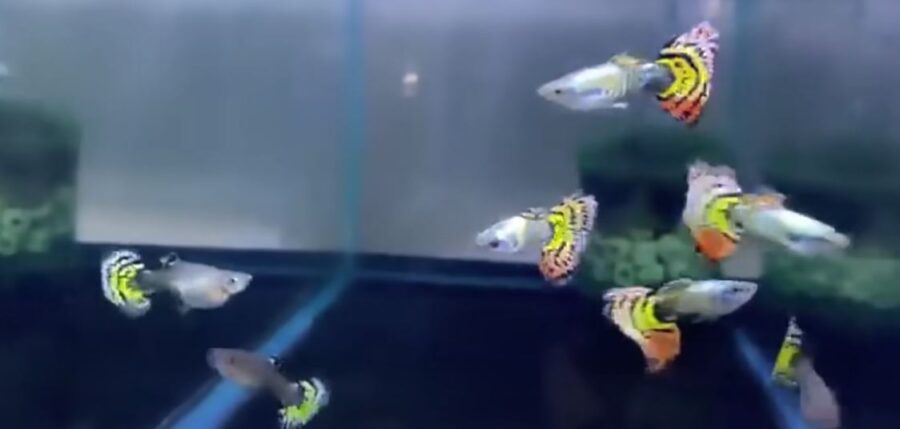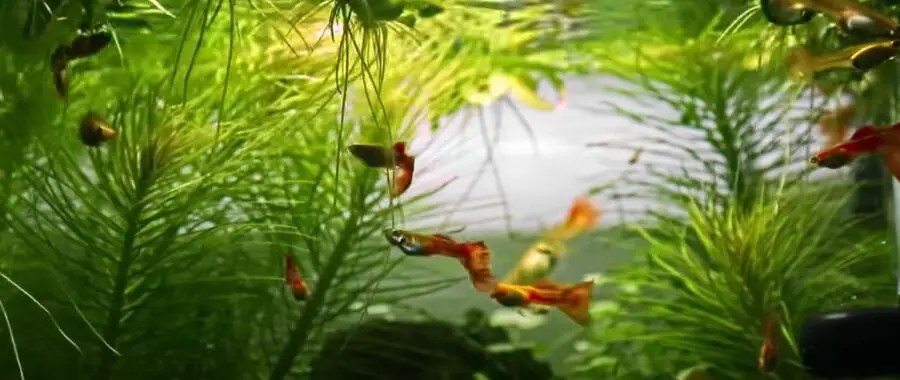Guppy fish are hardy, but they can still be picky. Do guppies like hard or soft water?
How do you increase water hardness? Why is this important for guppies?
In this article, we will explore whether or not guppies enjoy hard of soft water.
Do Guppies Like Hard or Soft Water?
Guppies as livebearers who enjoy pH levels at 7.0. Hard water is better than soft water because of it can host more:
- Calcium
- Magnesium
- Essential minerals
Water Hardness For Guppies
- dGH: 8-12
The higher your water hardness levels, the more your pH will increase. Read further to find out how to balance this in your guppy tank.

Can Guppies Live In Soft Water?
No. Soft water is acidic. We are trying to mimic the natural condition of guppies who thrive in the wild in river beds where water hardness and pH is balanced naturally.
Soft water cannot allow for the natural spread of magnesium and calcium. These fish will have trouble breeding and may become:
- Sluggish
- Lethargic
- Stressed
- Hide excessively
- Lose their appetite
- Die prematurely
General livebearer fish like guppies will not thrive in soft, acidic water. Keep the water hardness around 8-12 dGH and a ph balance of 7.0.
Why Hard Water Is Important For Guppies
The hardness of the water effects the osmoregulation operation of your guppies. They will be able to bring in and absorb more minerals in the water. It is difficult to do so in soft water.
Which Fish Like Hard Water?
Your aim is to raise carbonate hardness (KH) and the pH at the same time to prevent acidic water. You can use limestone rocks in the tank to harden the water. This raises mineral content as well.
Higher pH reaching up to 8.0 is tolerated by livebearers as long as the water hardness is between 8-12 dGH.
These fish enjoy hard water:
- Guppies
- Mollies
- Platys
- Endlers
These fish could develop a white film on their bodies or a white coating when the water is too soft. You can increase hardness with baking soda as well.

What is Aquarium KH?
It can get confusing when carbonate hardness can be referred to as multiple names and abbreviations such as:
- KH
- Temporary hardness
- Total alkalinity
- Buffering capacity/buffer
- Acid-neutralizing capacity (ANC)
Carbonate Hardness measures carbonates (CO3) and bicarbonates (HCO3) dissolved in tank water. This is a protective barrier around the pH in the water.
They go hand in hand to control acidity and alkaline. You cannot see carbonate hardness in the tank. You will have to measure it with test kits intended for this purpose.
How Often to Test Water Hardness in Aquarium Water
Test kits are varied and some will instruct you to use them more often. We test our tank water according to how much dKH or carbonate hardness is preferred in the tank.
Here some recommendation for freshwater tanks and the frequency of testing for water hardness:
- 4 dKH or less: Test KH once a week.
- 5 dKH or more: Test KH 1-2 times a month
While you are testing your tank water, its a good idea to also test the tap water you are using for your tank as well.
How To Increase Water Hardness
The best methods for increasing water hardness for your freshwater fish like guppies are as follows:
- Water changes
- Alkalinity buffers
- Crushed coral
- Aragonite
- Dolomite rock
- Soda ash
1. Water changes
Water changes help to add more water hardness. Make sure you tap water is supplying you with hardness at 4 dKH or higher.
If this is the case, you can go ahead and change the water up to 25% each week to reduce acidity.
Clean out the substrate with a gravel vacuum to pull out nitrates that also cause water hardness to drop.
2. Alkalinity buffers
Alkalinity buffer are easier and make it more simple to not have to constantly test, adjust or guess. The varieties of alkalinity buffers matches your aquarium. Here are some options:
- Freshwater Tank Alkalinity Buffer
- Marine Tank Alkalinity Buffer
- Reef Tank Alkalinity Buffer
There are buffers designed for specific fish, but guppies are considered hardy and they can thrive with freshwater buffers. Do not use phosphate based buffers that can fuel algae growth and reduce much needed minerals like magnesiun and calcium.
3. Crushed Coral
Adding crushed coral to the tank raises KH and GH. You can mix into the substrate or into the media of the filter. It releases calcium and carbonates into the water which raises hardness and reduces acidity.
4. Aragonite
Aragonite is a crystal version of calcium carbonate (CaCO3) made of small grains that looks like sand. You add it to the substrate in your guppy tank.
5. Dolomite rock
Dolomite rock is also called dolostone. It is made of:
- Calcium
- Magnesium
- Carbonate CaMg(CO3)
Dolomite is slower acting, but more desirable in freshwater tanks and also available in different colors to catch your eye.
6. Soda ash
Soda ash is known as sodium carbonate (Na2CO3). Smaller doses work better than too much at once. Calculate based on the size of your tank., There are soda ash calculators for this purpose.

Do Guppies Like Planted tanks?
Yes. Planted tanks are not only beautiful to look at they can provide essential benefits for your guppies such as:
- Hiding spaces
- Cover from light
- Consume nitrate
- Balance water parameters
Do Guppies Like Still Water or Currents?
Guppies do not need flowing water or strong currents. These livebearers thrive in calm riverbeds or basins. They like the water to be shallow and moving slowly in the wild.
This is why I don’t run a current in my guppy tank. Guppies that are farmed are generally weaker than those in the wild.
Adding strong currents will stress them further and make it harder for them to feed, breed or swim with minimal effort.
Guppy Water Parameters
- Water temp: 72-82 °F (22-28 °C )
- pH: 6.8-7.8.
- hardness (dGH): 8-12
- GH: 100-140 ppm
- KH: 140 ppm
- Ammonia: 0
- Nitrite: 0
- Nitrate Less than 40 ppm
Guppies enjoy hard water over soft water. As you harden the water, the pH increases. This hardy fish can withstand pH level up to 8.0, but a bit less if preferred.
Thank you for stopping by at HelpUsFish.com. We have plenty of articles on a wide variety of aquatic and marine life that may also pique your interest. See you again soon!
Table of Contents
